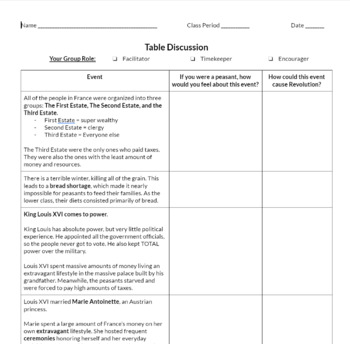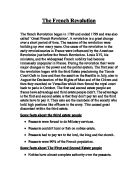The French Revolution was a significant event in European history that marked the end of the Bourbon monarchy and the rise of the French Republic. It took place between 1789 and 1799 and had both long-term and short-term causes.
One of the long-term causes of the French Revolution was the financial crisis facing the French monarchy. France had been heavily involved in several wars, including the Seven Years' War and the American Revolutionary War, which had drained the country's resources and left it deeply in debt. The monarchy had tried to raise funds through various means, including imposing new taxes on the already heavily taxed lower classes, but these measures had proved unpopular and had done little to solve the problem.
Another long-term cause of the French Revolution was the social and economic inequality that existed within French society. The country was divided into three classes: the First Estate (the clergy), the Second Estate (the nobility), and the Third Estate (everyone else). The First and Second Estates enjoyed many privileges and exemptions from taxes, while the Third Estate, which made up the vast majority of the population, was heavily taxed and had very little representation in the government. This led to a sense of frustration and discontent among the Third Estate, which contributed to the revolutionary spirit.
In the short term, several events served as triggers for the French Revolution. One of these was the publication of the book "What Is the Third Estate?" by Abbé Emmanuel Sieyès, which argued that the Third Estate, or common people, should have a greater role in the government. Another trigger was the financial crisis facing the monarchy, which reached a critical point in 1788 when King Louis XVI called for a meeting of the Estates-General to address the issue.
Finally, the events of the Bastille on July 14, 1789, are often seen as the beginning of the French Revolution. On that day, a group of Parisians stormed the Bastille, a prison in Paris, in search of gunpowder and weapons. The event, which became known as the Storming of the Bastille, sparked a series of uprisings and rebellions throughout France, which eventually led to the overthrow of the monarchy and the establishment of the French Republic.
In conclusion, the French Revolution was a complex event with both long-term and short-term causes. The financial crisis facing the French monarchy and the social and economic inequality within French society were long-term factors that contributed to the revolutionary spirit. In the short term, the publication of "What Is the Third Estate?" and the financial crisis that reached a critical point in 1788, as well as the Storming of the Bastille in 1789, served as triggers for the revolution.







